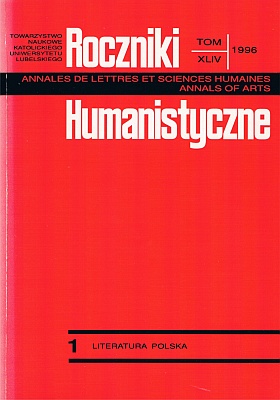Aby rozpoznać siebie. Rzecz o Andrzeju Kijowskim − krytyku literackim i publicyście
Abstrakt
Treating literary criticism and commentary as a territory in which a creator's convictions and his intellectual evolution are being revealed, the author depicts the portrait of Andrzej Kijowski as a critic and commentator. Kijowski is presented in a study in three disclosures. First he appears as a young and self-assured reviewer, fascinated by Marxism, who by means of uncomplicated criteria struggles for a "great novel". His approval of the politico-cultural situation, present in the Polish People's Republic in the first half of the 1950s, soon gives in to disappointment and self-criticism, which sounds so authentic in his first book, entitled Różowe i czarne (Pink and black, 1957).
In a further disclosure we see Kijowski as a versatile and careful researcher-humanist, who - having verified his relation towards Marxism - starts anew to build his own system of convictions and values. He treated his columns very seriously and this kind of writing occupies a prominent place in his output. Apart from his passion for literature and its borderlines Kijowski's passion for column writing becomes more and more prominent, a passion for careful observation of the various spheres of the group life, coming up with diagnoses, and drawing conclusions. The author presents a synthesis of the two kinds of activity as a right choice of the critic, a choice which was conducive to the abundance of his interests and intellectual insatiability. Kijowski's literary output then consisted of various areas of fascination. For instance, in Arcydzieło nieznane (The Unknown Masterpiece) the author attempts to define his own standpoint towards vis-a-vis literature with its key problem of what it is to be a masterpiece. Now in Listopadowy wieczór (A November Evening) he comes up with a clever study on the consciousness of the generation of Polish romantics, entangled in the dilemmas of history, politics and literature. Kijowski seems to look around almost all the spheres of life and culture. He firmly search for an object worthy of attention and journalistic reflection. At the same time he does not confine himself to the Polish issues; he is no stranger to the achievements of the European humanities (he reads, among others, Bataille, Levi-Strauss, Eliade).
The final phase of his writing, revealed in the third disclosure (the 1970s and 1980s), Kijowski turns to Catholicism as his ideological point of destination. He takes St Augustine as his patron, and humbly identifies himself with the latter's attitude and spiritual biography. He appreciates in St Augustine his accuracy of expression and mastery of self-analysis. At the end of his life Kijowski makes a confession. This confession is for the paper's author a prism through which we can see the whole of Kijowski's critical and journalistic writings in a coherent way. His literary work is the way of an intellectual who traverses the complex paths of the world in quest of the Highest value. In the end the author of Tropy (Tracks) finds It in God and the Church.
The author proves in his work that the attitude of a searcher had been from the very beginning "written in" the route of the intellectual development of the critic. It constituted his constant disposition and centre, organizing his whole critical and journalistic writing. In this perspective then the finale of Kijowski's mental biography is neither strange nor unexpected, but internally justified and implicitly anticipated. Kijowski's Catholicism reaches out to transcendence and crowns his hitherto quests and cognitive passions.
In the conclusion the author outlines a parallel between Andrzej Kijowski and Stanisław Brzozowski, a critic and thinker who also had walked the way from leftist fascination to Catholicism. This parallel is at the same time a proposal to study the tradition of Polish criticism which has its origin just in Brzozowski's writing, and further back in Maurycy Mochnacki. The distinguishing features of this tradition are the following: ardent quest for ideas, "profession", fiery temperament, subject matter (History, Nation, Literature), and, eventually, reaching the Truth. These features are, as it were, incomplete, not fully confirmed due to a sudden conclusion of the biography. The author regards Kijowski, among the contemporary Polish critics, as belonging to this tradition.
Copyright (c) 1996 Roczniki Humanistyczne

Utwór dostępny jest na licencji Creative Commons Uznanie autorstwa – Użycie niekomercyjne – Bez utworów zależnych 4.0 Międzynarodowe.





